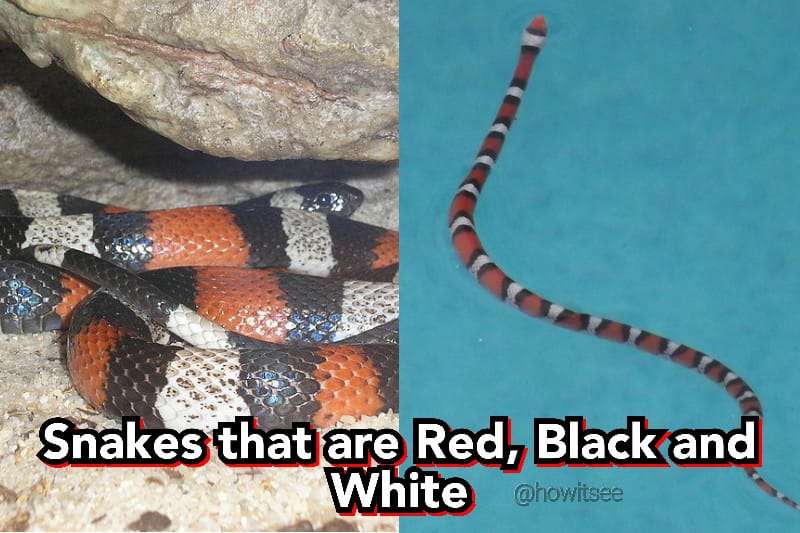We all know snakes come in all shapes, sizes, and colors. These reptiles are common in most parts of the world, but there are some species of snakes with unusual quirks that are far less common than others.
Keeping this in mind, we are back with a list of some common snakes that are red, black, and white. It means that these particular species of snakes have all three colors present.
No wonder some of them are among the most beautiful snakes in the world. Probably, you have heard of this, “Red and yellow, kill a fellow; red and black, friend of Jack.”
It signifies that the snakes in the list are not harmful to us except for one. We know what you’re thinking of. So, from coral snakes to milk snakes, let’s begin our list of Snakes that are Red, Black, and White.
20 Snakes that are Red, Black, and White
1. California Mountain Kingsnake
| Scientific Name | Lampropeltis zonata |
| Size | 24-30 inches |
| Life Span | up to 20 Years |
| Location | Western North America |
| Toxicity | Not Venomous |
| Diet | small snakes, lizards, salamanders, rodents, birds, and eggs |
Let’s begin the list of black, white, and red snakes with California Mountain Kingsnake. It is an incredible red snake with black and white bands all over it.
California Mountain Kingsnakes are non-venomous snakes making them good pets. These snakes are mostly found in the mountain regions of western North America.
2. Prairie Kingsnake
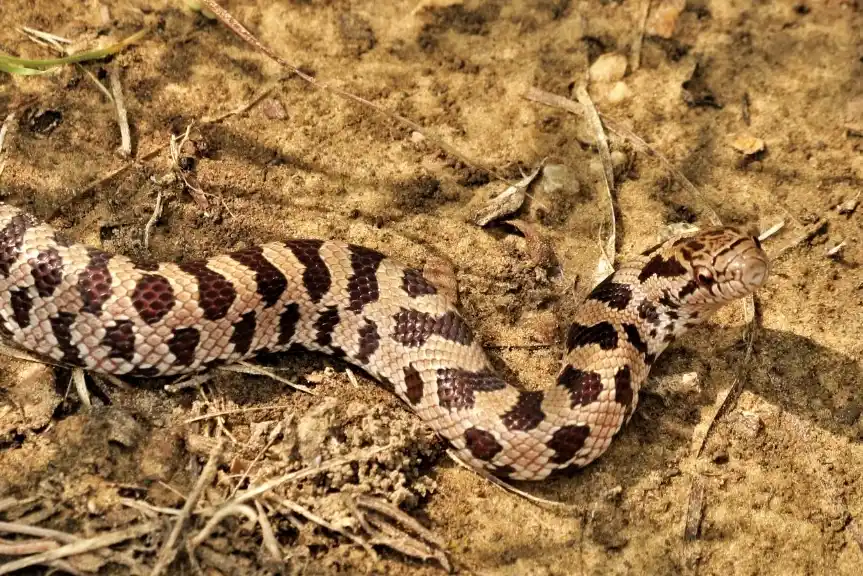
| Scientific Name | Lampropeltis calligaster |
| Size | 30-43 inches |
| Life Span | up to 23 Years |
| Location | Southeastern United States |
| Toxicity | Not Venomous |
| Diet | insects, mice, amphibians, small reptiles & snakes |
Prairie Kingsnake is a reddish-brown non-venomous snake with a white shade throughout the belly and black & red spots all over the body.
These snakes are very easy to keep as pets and best for beginners. These snakes mainly feed on small reptiles and amphibians.
3. Sinaloan Milk Snake
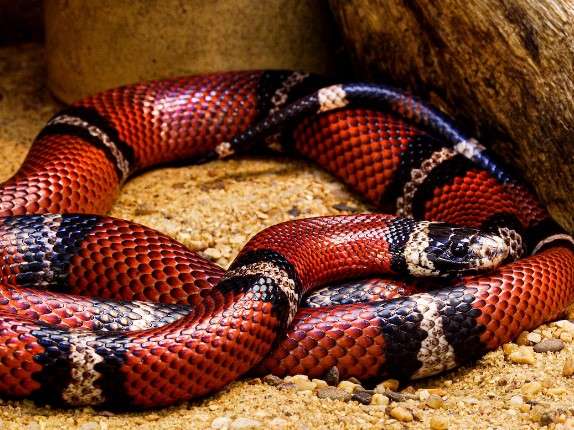
| Scientific Name | Lampropeltis triangulum sinaloae |
| Size | 40 inches |
| Life Span | up to 20 Years |
| Location | Mexico in the states of Sonora, Sinaloa & Chihuahua |
| Toxicity | Not Venomous |
| Diet | reptile eggs, lizards, snakes, amphibians, birds and small rodents |
Another beautiful red, white & black snake is the Sinaloan Milk Snake. It’s a completely harmless snake that mainly feeds on eggs, birds, and small rodents.
They love to stay in dry-rocky semi-desert regions. These snakes are predominately in red color with black & white bands all over them.
4. Red-Tailed Coral Snake
| Scientific Name | Micrurus mipartitus |
| Size | up to 48 inches |
| Life Span | 10-15 years |
| Location | Panamá, Colombia, Ecuador & Venezuela |
| Toxicity | Venom is highly neurotoxic |
| Diet | other small snakes, skinks, and lizards |
Red-Tailed Coral Snake, also known as Many-Banded Coral Snake is one of the highly venomous snakes in the world. Its venom is highly neurotoxic.
Red-Tailed Coral Snake is black and white in color but has red shade bands on its head and tail. It is a very beautiful yet dangerous snake.
5) Arizona Coral Snake
| Scientific Name | Micruroides euryxanthus |
| Size | 13-24 inches |
| Life Span | 10 years |
| Location | central and southern Arizona |
| Toxicity | Highly venomous |
| Diet | blind and black-headed snakes, lizards |
These snakes are widely in red, black, and yellow strips; however, here we are mentioning Arizona coral snakes (also known as Western coral snakes or Sonoran coral snakes) that are in red, black, and white strips.
These snakes are tiny and beautiful but don’t misjudge them.
Their venom is similar to that of the cobra, but due to their small size, they deliver significantly less venom that is not enough to pose as much danger to humans. Arizona Coral Snakes are mainly found in arid and semiarid regions.
6) Eastern Milk Snake
| Scientific Name | Lampropeltis triangulum |
| Size | 24-36 inches |
| Life Span | 15-20 years |
| Location | Maine to Ontario in the north to Alabama and North Carolina in the South |
| Toxicity | not venomous |
| Diet | Lizards, and small rodents |
Let’s jump on to the sixth red, black, and white snake, i.e., the Eastern Milk Snake. In the southern areas of its region, most Eastern Milk Snakes are found in red, black, and white patterns.
These snakes are non-venomous and have smooth and shiny scales. Eastern Milk Snakes are commonly found in rural areas or open habitats like forest edges.
They primarily feed on mice or other small rodents, birds, eggs, etc Eastern Milk Snakes are larger than venomous coral snakes.
7) Sonoran Shovel-Nosed Snake
| Scientific Name | Sonora palarostris |
| Size | 17 inches (maximum length) |
| Life Span | 10+ years |
| Location | the southwestern United States and northwestern Mexico |
| Toxicity | not venomous |
| Diet | various invertebrates, including insects, spiders, scorpions, & centipedes |
Sonoran Shovel-Nosed Snakes are non-venomous snakes from the genus Sonora and the family Colubridae. These desert snakes are native to the Sonoran Desert in North America.
Most people get confused between the Sonoran Shovel-Nosed Snake and the Arizona Coral Snake due to their black, yellow (or whitish), and red bands. But the common difference is their snout.
The coral snake has a black snout, while the Sonoran Shovel-Nosed snake has a yellow snout. Another difference is the color of their belly.
Coral snakes have patterns on their bellies, while Shovel-Nosed snake has a solid yellow belly. It’s good to know the primary differences between these two snakes because, unlike Sonoran Shovel-Nosed snakes, coral snakes are venomous.
8) Western Milk Snake
| Scientific Name | Lampropeltis gentilis |
| Size | 13.8-53.9 inches |
| Life Span | 15-20 years |
| Location | Montana and South Dakota, south to Louisiana, and west to Arizona |
| Toxicity | not venomous |
| Diet | reptile eggs, lizards, snakes, amphibians, birds and small rodents |
Western Milk Snakes, also known as Pale Milk Snakes, are the species of Milk Snakes commonly found in Grasslands, Limestone, and other rocky areas.
These tri-colored snakes have a band comprised of black, white, and red or orange colors. Like other Milk snakes, these snakes primarily feed on mice, small lizards, and other small snakes. Also, they are non-venomous.
9) Scarlet Kingsnake
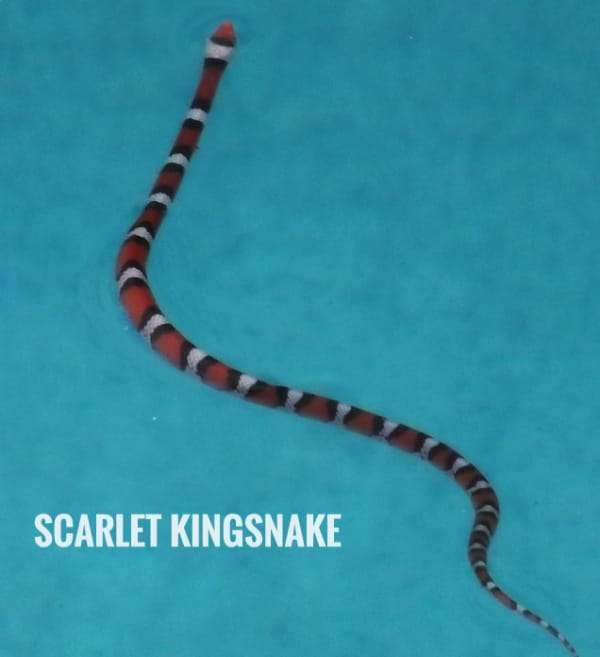
| Scientific Name | Lampropeltis elapsoides |
| Size | 14-20 inches |
| Life Span | 12-13 years |
| Location | throughout Georgia |
| Toxicity | not venomous |
| Diet | mice and other small rodents |
Another member of the milk snakes that are red, white, and black is the Scarlet Kingsnake, also known as the Scarlet Kings Milk Snake. Like other milk snakes, Scarlet Kingsnakes are non-venomous and mainly feed on mice and other small rodents.
These snakes also have tri-colored bands all over the body, consisting of black, white, or yellow and red colors. At the time of birth, scarlet kingsnake has white, black, and red banding, and over a time period, they develop varying shades of yellow.
Must Read: What colors do Snakes see? Snake Vision
10) Mexican Milk Snake
| Scientific Name | Lampropeltis annulata |
| Size | 24-30 inches |
| Life Span | 12-20 years |
| Location | northeastern Mexico in Coahuila, Tamaulipas, and Nuevo León |
| Toxicity | not venomous |
| Diet | rodents & lizards |
Mexican Milk Snake, also known as Tamaulipas Milk Snake, is a species of Milksnake native to the hot semiarid regions of northeastern Mexico. These snakes have a slightly different pattern with narrow bands of yellow or white and black colors.
The popular phrase, “Red on yellow kill a fellow. Red on black venom lack,” doesn’t apply to Milk snakes, as they are non-venomous.
11) Miami Corn Snake
| Scientific Name | Pantherophis guttatus |
| Size | 24-51 inches |
| Life Span | up to 23 years |
| Location | Southeastern and Central United States |
| Toxicity | not venomous |
| Diet | rodents |
The corn snake is a species of North American rat snake that hunts its food through constriction. Corn snakes have been named like this as they’re primarily present near grain stores, where they hunt mice and rats that eat harvested crops.
Since they’re not venomous, this snake species benefits humans by assisting in controlling populations of wild pests. Hence, further protecting our crops and spreading of diseases.
Miami snake has a silver body with red-orange patches on it. Their age expectancy can exceed 23 years but only in captivity.
Their food includes young mice, bird’s eggs, white-footed mice, or some other amphibians and reptiles. Corn snakes are one of the most popular pet snakes throughout the world.
12) Central American Milk Snake
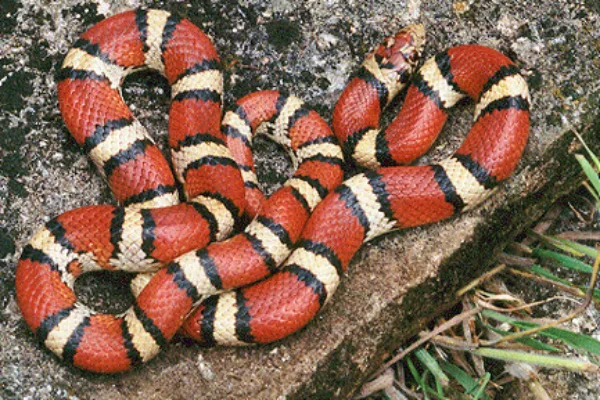
| Scientific Name | Lampropeltis triangulum |
| Size | 14-72 inches |
| Life Span | up to 20 years |
| Location | Southeastern extreme of Canada through the eastern half of the United States |
| Toxicity | not venomous |
| Diet | birds, bird eggs, lizards, snake eggs |
Central American milk snake is a species of kingsnake that is found in the North and Central American regions of the world. Milk snakes are found in forested areas, near swamps, rocky slopes, and beaches. They have smooth, shiny scales predominantly of red, black, and white colors.
Milk snakes have only tiny teeth and are non-venomous. Hence, makes them harmless for human beings. Milk snakes hunt down crickets, insects, slugs, earthworms, lizards, bird’s eggs, frogs, fish, and their snakes.
Male ones are larger than female milk snakes, but female ones are bulkier than males. They are also popular pets throughout the world.
13) South American Milk Snake
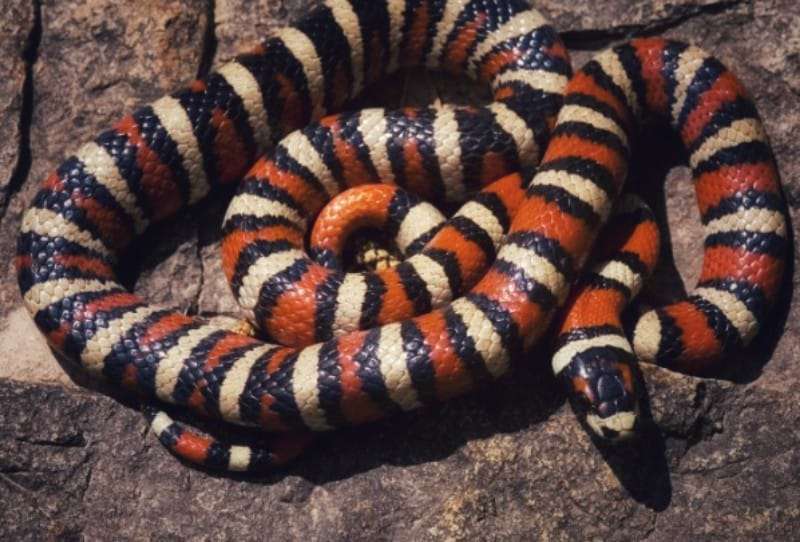
| Scientific Name | Lamproletis micropholis |
| Size | 14-69 inches |
| Life Span | up to 20 years |
| Location | Colombia, Costa Rica, Ecuador, Panama, and Venezuela |
| Toxicity | not venomous |
| Diet | bird’s eggs, frogs, fish |
The South American milk snake, commonly called the Ecuadorian milk snake, is a species of milk snake that is found in Colombia, Costa Rica, Ecuador, Panama, and Venezuela.
They possess three colors, red, black, and mustard, in which alternating red and mustard bands surrounded with black strips can be seen. Milk snakes are not venomous and hence harmless to human beings. They feed on small rodents, bird eggs, frogs, fish, and their eggs as well.
Milk snakes have a size of 14 to 69 inches. Male and female ones grow to the same length, but females are slightly bulkier than males. They are also among the most popular pet snakes in the world.
14) Pueblan Milk Snake
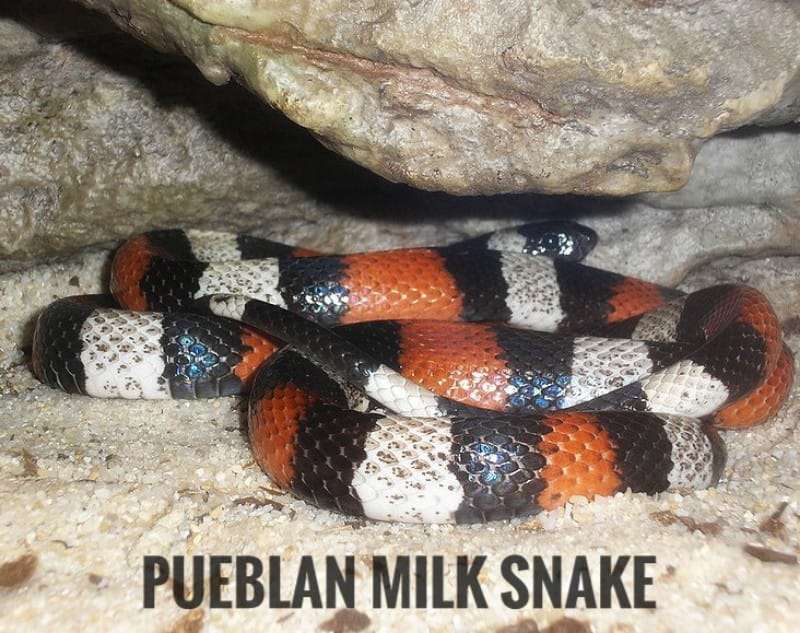
| Scientific Name | Lampropeltis triangulum campbelli |
| Size | 36-48 inches |
| Life Span | up to 20 years |
| Location | southern Puebla, eastern Morelos, and northern Oaxaca, Mexico |
| Toxicity | not venomous |
| Diet | mice, rats, birds, lizards, frogs |
Pueblan milk snake also called Campbell’s milk snake is one of the most beautiful snakes with vivid color variations. They have black, red, and white color bands all over the body.
Not only this, Pueblan milk snakes have extensive white bands giving them distinguishing characteristics from other milk snakes. They rarely bite.
Their diet comprises a wide range, including mice, rats, birds, lizards, frogs, and other snakes, including venomous snakes. They are non-venomous and can grow up to 48 inches.
15) Florida Scarlet Snake
| Scientific Name | Cemophora coccinea |
| Size | 14-20 inches |
| Life Span | 20+ years |
| Location | throughout Florida |
| Toxicity | not venomous |
| Diet | small rodents |
Let’s end the list of snakes that are red, white, and black with the Florida Scarlet snake, also known as the Northern Scarlet snake.
They have skinny bodies with band markings in black, white, and red colors. They have shiny scales and are non-venomous.
Florida Scarlet Snakes are not dangerous to humans or pets and feed on small rodents.
16) Painted coral snake
| Scientific name | Micrurus corallinus |
| Size | approx. 98 cm |
| Life span | 7 years |
| Location | South America, Brazil, Argentina, and Paraguay |
| Toxicity | Highly venomous |
| Diet | lizards, other snakes, aphisbenids, and gymnophils |
Have you ever encountered painted coral snakes in the landscapes of South America, Brazil, Argentina, and Paraguay? Scientifically, this snake is known as Micrurus corallinus. The most interesting feature of this snake is its color variation.
Looking at its length, this snake can grow up to 98 cm. Do you know these snakes like to eat lizards, other snakes, aphisbenids, and gymnophils?
It had a black head with either white or yellow bands. This snake also had red bands on the body.
Considering all three colors, we can see this color has black, red, and yellow bands. These snakes are really thin and slim, with a round head. Also, the eyes of this snake are round and small. The sheen of this snake is shiny and smooth.
17) Common garter snake
| Scientific name | Thamnophis sirtalis |
| Size | approx. 120 cm |
| Life span | More than 10 years |
| Location | North America |
| Toxicity | Mild venom |
| Diet | leeches, snails, insects, fish, lizards, other snakes, small birds, and rodents |
The common garter snake is indigenous to North America. Do you know this snake, known as Thamnophis sirtalis? Along with this, this species of snake falls under the Natricinae subfamily within the Colubridae family and exhibits several recognized subspecies.
Talking about this snake’s appearance, these serpents are slender, with only a few individuals growing longer than 4 feet. Also, they display a diverse range of colors, including green, blue, white-yellow, gold, red, orange, brown, and black.
18) Texas long-nosed snake
| Scientific name | Rhinocheilus lecontei |
| Size | 56-100 cm |
| Life span | 12-20 years |
| Location | Northern Mexico, San Luis Potosí, Chihuahua, southwestern United States, California, Nevada, Utah, Idaho, Arizona, southeastern Colorado, and Texas |
| Toxicity | Non-venomous snake |
| Diet | Lizards, small snakes, and rodents |
Have you heard about the long-nosed snake? It’s a harmless snake that belongs to the Colubridae family. Do you know this snake is native to North America? And what’s interesting about it is its common name, which comes from its long, slightly upturned snout.
Also, if you ever come across one, you’ll notice its striking tricolor pattern. It has black and red markings arranged like saddles on a white-yellow or cream-colored background.
Considering its size, adults usually measure between 22 and 32 inches, although there have been records of some reaching up to an impressive 41 inches.
19) Arrow-headed coral snake
| Scientific name | Micrurus alleni |
| Size | 70–132 cm |
| Life span | 7 years or more |
| Location | Central America, Nicaragua, Costa Rica, Panama, and Honduras |
| Toxicity | venomous |
| Diet | Lizards and other small animals |
The arrow-headed coral snake is scientifically known as Micrurus alleni. Talking about where you can spot these snakes? These snakes can be spotted in several Central American countries, including Nicaragua, Costa Rica, Panama, and Honduras.
According to its length, it is a medium-sized snake with a maximum length of 132 cm and an average size of 70–90 cm in adults.
Also, its striking appearance features a combination of red, black, and white or yellow colors. Moreover, it is active mainly at night and can be observed in marshy jungles, rivers, or ravines.
20) Aquatic coral snake
| Scientific name | Micrurus surinamensis |
| Size | Approx 135 cm |
| Life span | 7 years or more |
| Location | swamp eels, bony fish, other snakes, and amphibians |
| Toxicity | venomous |
| Diet | swamp eels, bony fish, other snakes, and amphibians |
M. surinamensis, commonly known as the Aquatic Coral Snake, has striking body markings. Its vibrant red rings are interspersed by sets of 5 to 8 triads. Also, each triad comprises a wide central ring flanked by two narrow black rings, separated by two equally slender white, cream, or yellowish rings.
Do you know This snake typically reaches an average length of 80 to 100 cm although some individuals can grow up to a maximum of 135 cm?
Considering its eating habits, its diet is diverse, including swamp eels, bony fish, other snakes, and amphibians. The venom of this snake can cause paralysis of the cranial nerve and can be fatal.
Are Red, Black, And White Snakes Venomous?
Yes, some of the red, black, and white snakes mentioned above are venomous. Specifically:
- Red-Tailed Coral Snake – Highly venomous with neurotoxic venom.
- Arizona Coral Snake – Although its venom is not as potent as some cobras, it is still venomous.
- Painted Coral Snake- A venomous snake found in South America.
- Arrow-Headed Coral Snake – A venomous snake found in Central American countries.
- Aquatic Coral Snake – Another venomous coral snake with striking markings.
These snakes have venom that can be harmful to humans, and their bites can potentially lead to serious consequences, including death. It is essential to exercise caution when encountering any snake in the wild, as not all snakes within this color pattern are non-venomous.
Here, we conclude our article on “Snakes that are Red, Black, and White.” Most of them are from the Milk Snake species. We hope you like our post. We will be back with another interesting post. Till then, stay tuned with us and read the articles mentioned below.
FAQs:
Q1: Are all snakes that are red, black, and white safe to keep as pets?
Ans: Most of the snakes mentioned, like California Mountain Kingsnake and Prairie Kingsnake, are safe as pets. However, always research specific care requirements before keeping any snake as a pet.
Q2: What does “Red and yellow, kill a fellow; red and black, friend of Jack” mean?
Ans: This phrase helps distinguish between venomous and non-venomous snakes. If the red and yellow bands touch, the snake is venomous; if red and black touch, it’s non-venomous.
Q3: Are all snakes in the list non-venomous?
Ans: No, some snakes, like the Red-Tailed Coral Snake and Arizona Coral Snake, are highly venomous. Always exercise caution around any snake in the wild.
Q4: Do all red, black, and white snakes follow the same pattern?
Ans: No, patterns vary among species. Some have bands, while others have rings. For example, the Sonoran Shovel-Nosed Snake has bands, while the Arrow-Headed Coral Snake has rings.
Q5: Can you keep venomous snakes as pets?
Ans: It is not recommended to keep venomous snakes as pets due to safety concerns. Handling them requires expertise, and bites can be dangerous.
Q6: What is the lifespan of these red, black, and white snakes?
Ans: Lifespan varies, but many in the list can live up to 20 years or more in captivity, such as the California Mountain Kingsnake.
Q7: Are there any red, black, and white snakes native to South America?
Ans: Yes, the Painted Coral Snake is native to South America, found in countries like Brazil, Argentina, and Paraguay.
Q8: What is the significance of the phrase “Red on yellow kill a fellow. Red on black venom lack” in snake identification?
Ans: This phrase helps differentiate between coral snakes with venomous bites (red on yellow) and non-venomous mimics like milk snakes (red on black).
Q9: Are there any red, black, and white snakes that mimic venomous species?
Ans: Yes, milk snakes, such as the Scarlet Kingsnake and Mexican Milk Snake, mimic the coloration of venomous coral snakes for protection.
Q10: What regions are known for having a high population of these snakes?
Ans: Snakes like the California Mountain Kingsnake are found in western North America, while others, like the Sinaloan Milk Snake, are native to Mexico.
Also Read:

As a content writer, I like to write about different niches. I have a curiosity about nature and animals. And like to learn about them. Through my writing, I like to share my experience and knowledge with you. I hope you are enjoying it too.
